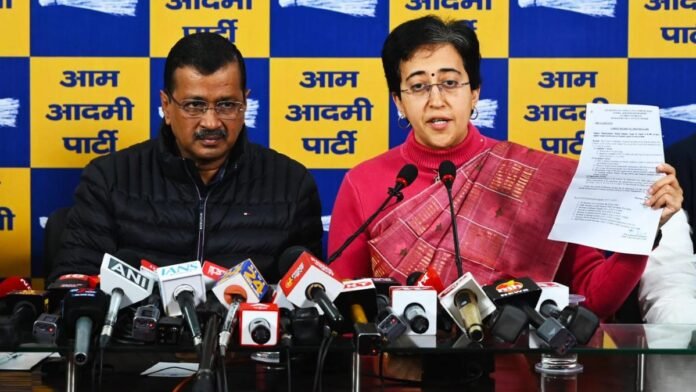Kejriwal Scheme Expose: Ahead of the Delhi Assembly elections, Arvind Kejriwal announced a financial assistance scheme targeting women. Under this promise, each woman above 18 years in Delhi was to receive Rs 2,100 monthly as direct financial aid. The announcement generated immense public interest, with many viewing it as a game-changer for women’s empowerment. However, recent reports have cast doubt on the feasibility and sincerity of this commitment.
Table of Contents
What is in Advertisements, which was given by the Govt Officials


These advertisements have raised controversy on AAP’s yojana announcements. Both Mukhyamantri Mahila Samman Yojana and Sanjeevani Scheme, as per the advertisements these schemes do not exist in Delhi Government programs.
The Allegations
Was this scheme ever financially feasible? According to recent disclosures, the promise was labeled as unrealistic by officers within Kejriwal’s administration. Government officials reportedly issued internal reports highlighting the financial impracticality of such a scheme. These reports were later published in public newspapers, adding fuel to the controversy.
The primary allegations revolve around:
- Lack of Budget Allocation: Documents reveal no concrete financial planning to back the scheme.
- Impact on State Finances: Would the scheme cost over Rs 12,000 crore annually, as experts estimate? Could Delhi’s coffers bear such a burden without additional revenue streams?
- Political Stunt Allegations: Is this another case of making hollow promises purely for electoral gains?
What Do the Reports Say?
An official report issued by senior bureaucrats underlines that Delhi’s financial health is already under strain. The state faces high levels of debt and recurring expenses, leaving little room for additional welfare programs without substantial external funding or increased taxation.
The report categorically states that implementing the scheme would either:
- Require cutting funds from other critical sectors such as health and education.
- Lead to a sharp rise in state taxes, burdening citizens further.
Kejriwal’s Defense
How does Arvind Kejriwal justify this promise? Responding to the criticism, Kejriwal defended his promise by reiterating his government’s commitment to public welfare. According to him, his administration has successfully implemented similar schemes, and the women’s financial aid program would be a logical extension of those efforts.
Kejriwal argued that:
- The scheme would be funded by reducing corruption and increasing revenue collection in Delhi.
- His government has a proven track record of delivering on promises, pointing to free electricity and water schemes already in place.
Opposition’s Reaction
Does the opposition have a point in calling it a fraud? Opposition leaders have termed the scheme a “fraud” and an “election gimmick.” They claim that Kejriwal’s promises are designed to mislead voters without considering their long-term impact on the state’s economy.
Critics have also pointed out inconsistencies in Kejriwal’s statements and accused him of making such announcements without consulting economic advisors or understanding ground realities.
What This Means for Delhi
Could this scheme reshape Delhi’s economy and politics? If implemented, the scheme could have widespread implications:
- Economic Strain: Could diverting funds to sustain the program cripple other development projects?
- Public Expectations: Will failure to deliver on such promises erode public trust in governance?
- Political Fallout: Could the controversy shape the political narrative in Delhi, influencing voter sentiment in upcoming elections?
While Arvind Kejriwal’s promise of financial aid for women initially garnered widespread praise, does the unfolding controversy raise serious questions about its feasibility and intent? As the debate continues, will the Aam Aadmi Party address these concerns transparently and provide clarity on the funding and execution of the scheme? Meanwhile, voters in Delhi must weigh the realities of the state’s financial health against promises made during election campaigns.
On the Other Hand…
Political Landscape Amid the Controversy
Will this controversy impact elections? While Kejriwal’s government faces scrutiny, BJP’s inability to counter AAP with a strong CM candidate and reliance on central leaders like Modi and Shah may leave the party struggling in Delhi. AAP’s strategy now hinges on attracting floating voters who shift between AAP, BJP, and Congress in different elections. To win in 2025, AAP has proposed four new schemes to maintain voter appeal, but controversies over two of them risk undermining its plans.
Can CM Atishi take any action against the officers who published the advertisement?
Delhi Chief Minister Atishi issued a statement and called both these notices false. CM Atishi said, ‘The notices printed today are wrong. BJP has pressurized some officers to publish wrong information. Administrative and police action will be taken against the officers. The cabinet notification has come to the public.’

According to the National Capital Territory of Delhi (Amendment) Ordinance, 2023, Delhi CM Atishi cannot take any action directly on the officers. For transfer, suspension or any kind of action on the officers, she will have to take the matter to the National Capital Civil Service Authority. Where the Chief Secretary and Home Principal Secretary of Delhi will discuss the matter with her.
The Chief Secretary and Home Principal Secretary of Delhi are appointed by the Central Government, so they will not support any action. Even then, if the authority decides to take any action, the final decision in this matter will be of the Lieutenant Governor of Delhi.
Also read:

